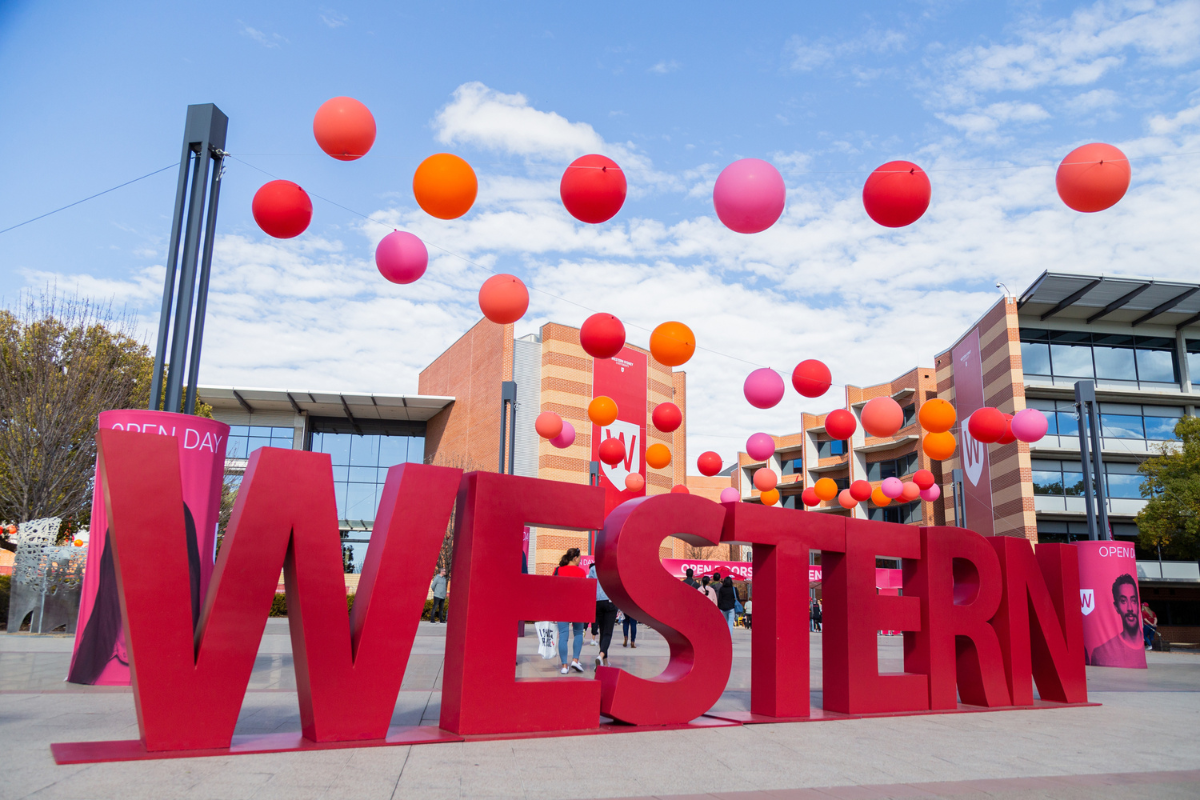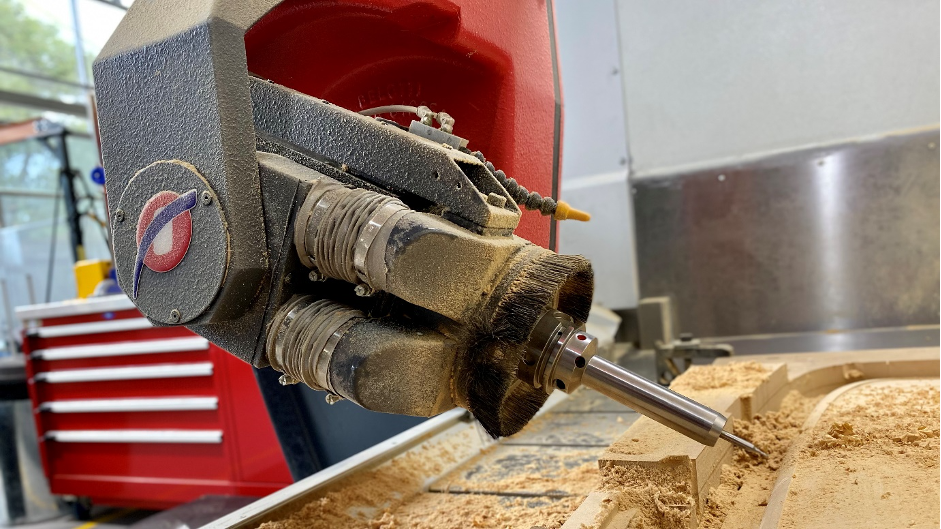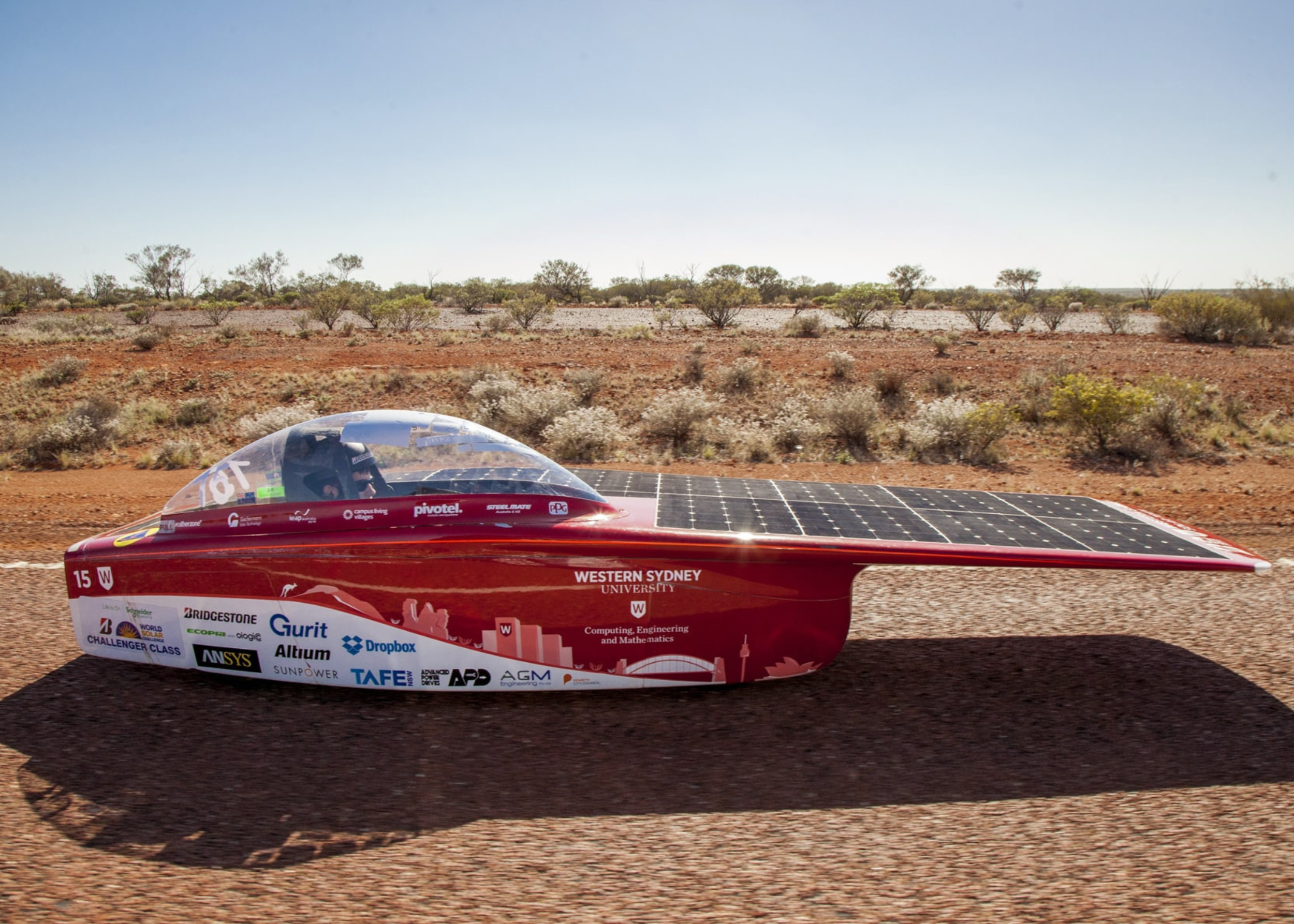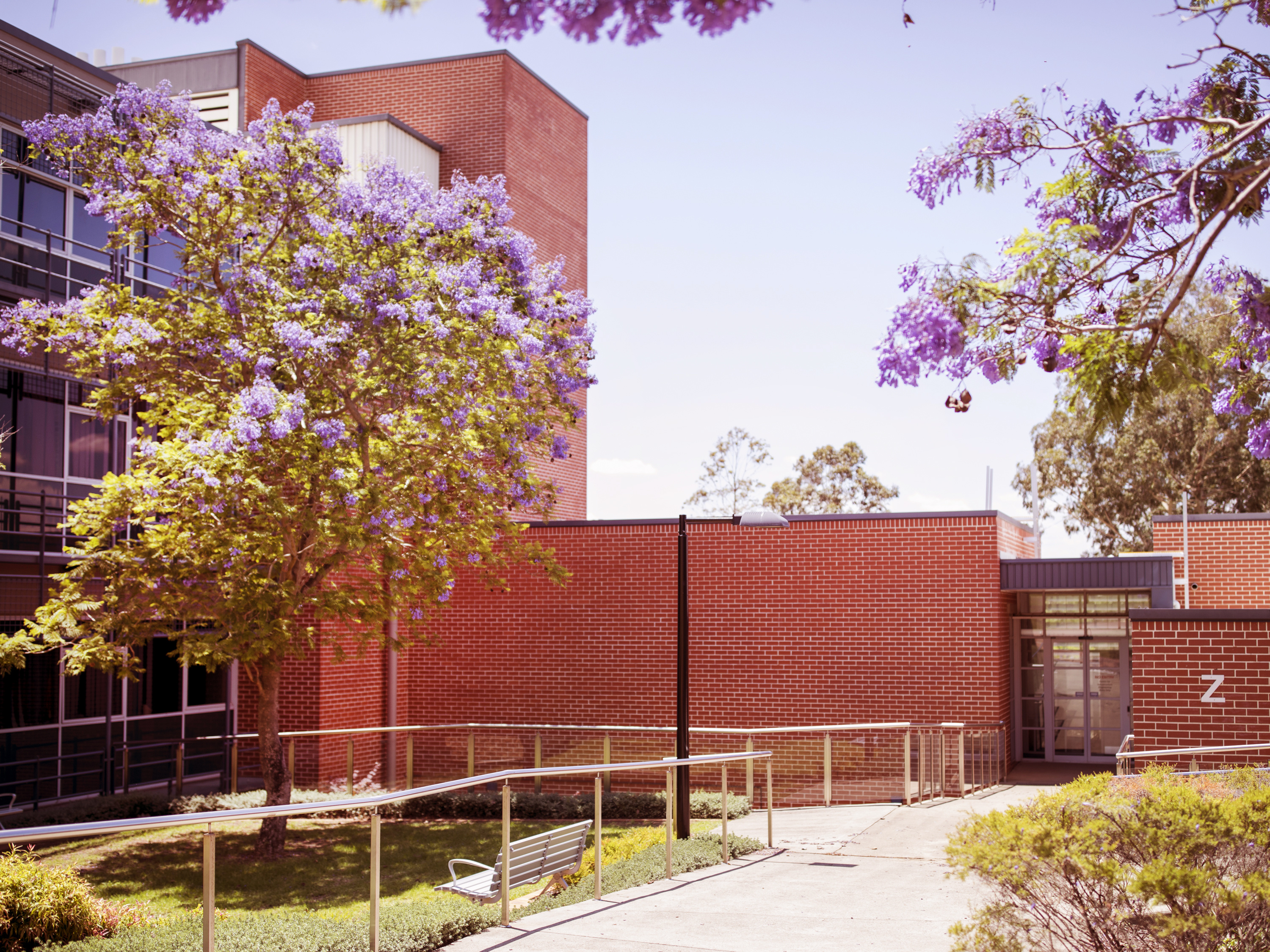Many future challenges exist at the nexus of environment, infrastructure and technology. Solutions to these will demand innovative engineering combined with applied science and business acumen. Engineers with a head for business will find many opportunities to leverage their highly developed analytical skills towards a host of technical and commercial challenges. This outstanding double degree program combines a 4 year Bachelor of Engineering (honours) degree with the 3 year Bachelor of Business degree to yield a course of study that takes only 5 years to complete (in full-time mode).
Engineering and Business at Western
REGISTER NOW FOR OPEN DAY 2024
Open Day is a great opportunity to discover all that Western has to offer.
Explore course options, meet academics and find out about our pathway options on Sunday, 30 June 2024.
Register now to join us. We can't wait to see you at Open Day 2024!

Bachelor of Engineering (Honours): The majors in Civil Engineering, Construction Engineering, Electrical Engineering, Mechanical Engineering, and Robotics & Mechatronics Engineering are fully accredited by Engineers Australia at the Penrith, and Parramatta campuses. This ensures that your education is recognised in Australia and abroad. The majors of Advanced Manufacturing, Materials Engineering, and Sustainability Engineering are provisionally accredited. They are expected to transition to fully accredited when the first cohort graduates.
As part of this program, you will also complete a minimum of 450 hours of industrial experience which helps you to emerge with real-world experiences when you commence your professional career.
Bachelor of Business: Where the full recommended subject sequence of the major is satisfactorily completed.
For a full listing of accreditation details and accreditation per major please visit our handbook.
Students undertaking engineering programs at WSU enjoy access to a spectrum of advanced and state-of-the-art facilities. Examples include the brand-new campus Parramatta Engineering Innovation Hub, and the Kingswood Advanced Manufacturing Precinct and Makerspace.
The Parramatta Engineering Innovation Hub (PEIH) is located in the heart of Parramatta and provides unmatched opportunities for students to collaborate with other students, academic staff, and industry. Facilities include collaboration-focussed teaching spaces and a new Makerspace. Innovation and entrepreneurship opportunities also exist via Launch Pad and co-located industries and agencies.
The Advanced Manufacturing Precinct located on the Kingswood campus is an expansive workshop based on emerging technologies in additive manufacturing, 3D printing and leading edge CNC machining. The precinct is used extensively for mechatronics, mechanical engineering, and industry collaborations. 3D printing in metals including stainless and tool steel and speciality processes in digital anatomy printing is also available as well as an extensive wood-and metal-working facilities.
Our Makerspaces at Kingswood and PEIH enable students to access advanced manufacturing equipment to produce their own prototypes and parts. These specialist workshops include wood and metal manufacturing equipment, world class CNC, and additive manufacturing with 3D printing in plastics and metal. Our Makerspaces support your fabrication projects while you are studying and are designed to help you produce high performance parts during your engineering journey. You can also access Makerspace facilities and equipment for your personal interest projects.
WSU Engineering programs also allow you to apply your theoretical learnings to fascinating real-world challenges, like Western's Solar Car project, Formula-SAE project, Unlimited Robotics Club, and Engineers Without Borders student chapter. The Engineering Summer Placement Program is also available for high-achieving students to undertake paid placements.
Our students gain the exciting opportunity to be part of the WSU Solar Car Project. Producing four cars over a rich ten-year history, the team has enjoyed many successes. In the 2017 Bridgestone World Solar Challenge, the Team placed 6th overall and were the first Australian team to finish. In 2018, the team became the first international team to win the prestigious American Solar Challenge, beating Michigan University’s 18-year winning streak. The team also broke the record in 2019 for the lightest solar-powered vehicle ever to race weighing only 116.8kgs. Currently the team is undertaking a range of activities including a composite half scale model of the 2021 vehicles, an all-electric go-kart build and are about to embark on a regional NSW road show. These planned activities will help train the team and ensure they are ready for success in the 2023 Bridgestone World Solar Challenge.
If you would like to be a part of this journey and increase the depth of your own learning, click here to find out more.
Western Sydney University has been ranked in the Top 75 Universities for Engineering (Civil) and in the Top 300 in Electrical & Electronic Engineering, in 2021 Shanghai Rankings and QS World University Rankings by Subject.
In the 2021 QS World University Rankings by Subject, WSU is ranked in the Top 250 universities in the Built Environment discipline.
What you can expect to study
The program structure is outlined in our handbook. Here you can view all of the subjects you will be studying.
Available at the Parramatta and Penrith campuses
Manufacturing is continuously transforming as it integrates automation, analytics, intelligence, digitisation, and Internet of Things (IoT) into physical operations. In this major, you integrate techniques and methods to improve the sustainability and efficiency of manufacturing taking advantage of digitisation tools. You tackle complex problems, propose innovative solutions, and apply critical thinking to industry problems considering social, ethical and environmental factors.
Graduate destinations are varied and include:
Digital Product Design Engineer, Digital Process Engineer, Additive Manufacturing Engineer, Digital Twins Engineer, Systems Engineer, Automation Specialist, Robotics Specialists, Advanced Sensors Specialists, Industry 4.0 Transformation Specialist, IIoT Specialist.
This major includes a mandatory 450-hour industrial placement as a completion requirement for Engineers Australia accreditation as professional engineer.
Available at the Parramatta and Penrith campuses.
Civil engineering covers the fields of structural design, geotechnical engineering and water engineering, together with infrastructure design and environmental engineering. Graduates may pursue career paths in the fields of design, construction and management of engineering structures and be associated with private industry, government departments, or in city, municipal or shire councils. These career paths may include engineering projects related to residential and commercial buildings, highways and airports, water supply and sewerage schemes.
Graduate destinations include:
Civil Engineer, Structural Engineer, Geotechnical Engineer, Site Engineer, Water Engineer, Maintenance Engineer, Water Resources Engineer, Water Resource System Analyst, Hydrologist, Hydraulic Engineer, Water Treatment Operator, Subdivision Civil Approvals Engineer, Consulting Engineer, Project Engineer, Project Manager, Design Manager
This major includes a mandatory 450-hour industrial placement as a completion requirement for Engineers Australia accreditation as professional engineer.
Available at the Parramatta and Penrith campuses.
Construction Engineering consists of core subjects in structural engineering, project management and construction technologies. Graduates will work in the fields of construction, structural design, and project management. Career opportunities include those in the private or public sector on projects covering highways, airports, and residential & commercial buildings.
Graduate destinations include:
Construction Engineer, Structural Engineer, Geotechnical Engineer, Site Engineer, Subdivision Civil Approvals Engineer, Consulting Engineer, Project Engineer, Project Coordinator, Project Manager, Design Manager.
This major includes a mandatory 450-hour industrial placement as a completion requirement for Engineers Australia accreditation as professional engineer.
Available at the Parramatta and Penrith campuses.
The Electrical Engineering major includes core subjects from all branches of electrical engineering. Electrical Engineering program is one of the flagships of Western’s engineering whose core subjects such as Electrical Fundamentals, Power Electronics, Engineering Electromagnetics form the foundation for other programs such as Software Engineering and Biomedical Engineering program. Because of the vibrant and diverse offerings of Western’s engineering, its graduates will work in the fields of electronic components, computers, electro-magnetics, power generation and distribution systems, power and control in public utilities, telecommunications, manufacturing, and electrical systems.
Graduate destinations include:
Designers, data loggers, programmers, consultants, system engineers, data communications specialists, wireless communications engineers, and integrated circuit designers.
This major includes a mandatory 450-hour industrial placement as a completion requirement for Engineers Australia accreditation as professional engineer.
Available at the Parramatta and Penrith campuses.
Since the dawning of mankind an understanding of how materials can be obtained and used has been critical to successful human endeavour. Materials engineers are concerned with the highly technological and dynamic process of understanding, developing, and applying materials (metals, polymers, ceramics, composites) to a range of engineering problems. Students will develop skills necessary to synthesise relevant information so that they can be effective decision makers in a materials context. These skills will serve them well in varied career opportunities associated with biomedical devices, nanotechnology, advanced manufacturing, opto-electronics, energy, aerospace, and sustainable construction.
Graduate destinations include:
Materials engineers, Materials selection specialists, High temperature applications specialists, Extreme environments specialists, Advanced materials processing and development specialists, Semiconductor/electronic materials specialists, metallurgical and related process engineering.
This major includes a mandatory 450-hour industrial placement as a completion requirement for Engineers Australia accreditation as professional engineer.
Available at the Parramatta and Penrith campuses.
Mechanical engineering is a dynamic area involving the design and build of moving machines including engines that power transportation, industrial machinery, and a range of tools. Students put the core concepts of mechanical engineering, energy, thermodynamics, mechanics, kinematics, and fluid mechanics, into practical application in workshops, industry projects, and work integrated learning. Students design and construct machines and tools, monitor and evaluate their performance. Employment opportunities include automotive or mechanical engineer, control and instrumentation engineer.
Graduate destinations include:
Mechanical engineer, Aerospace engineer, Automotive engineer, CAD engineering, Control and instrumentation engineer, Maintenance engineer.
This major includes a mandatory 450-hour industrial placement as a completion requirement for Engineers Australia accreditation as professional engineer.
Available at the Parramatta and Penrith campuses.
Robotics and Mechatronic engineering combines electrical, computing and mechanical engineering and is at the forefront in designing smart machines and systems, such as pilotless spacecraft, car cruise control, automated factories and medical telerobotics. Students explore intelligent mechanical systems and automation through an extensive and integrated hands-on laboratory program, as well as work-integrated industry projects. Students learn in-depth knowledge about the design and construction of these systems to integrate, evaluate and address their performance. The multidisciplinary skills students develop are sought after by leading edge industries, including aerospace and biomedical engineering.
Graduate destinations include:
Robotic and autonomous systems engineer, Autonomous equipment engineer, Electronics design engineer, Instrumentation engineer, Automation engineer, Control systems engineer.
This major includes a mandatory 450-hour industrial placement as a completion requirement for Engineers Australia accreditation as professional engineer.
Available at the Parramatta and Penrith campuses.
Human society is facing ever increasing challenges from changing climate, expanding populations and industrial development. Traditional approaches to solve environmental problems needs rethinking and should consider circular economy, life cycle thinking, climate smartness, digitisation. In this Major, students assess various challenges in provision of water, food, infrastructure and energy then propose design solutions using holistic, futuristic and sustainable technologies and strategies. Through hands-on, real-life projects, students explore solutions that integrate technical, technological (IoT), social, cultural, geographical, regulatory and ethical factors. This major will benefit students aiming for careers such as Environmental Engineer/Scientist/Consultant, Natural Resources Manager, Waste Engineer/Manger/ Consultant, and Sustainability Engineer/ Manager/ Consultant.
Graduate destinations include:
Environmental Engineer, Environmental Scientist, Environmental Consultant, Natural Resources Manager, Waste Engineer, Waste Manager, Waste Consultant, Sustainability Engineer, Sustainability Manager, Sustainability Consultant.
This major includes a mandatory 450-hour industrial placement as a completion requirement for Engineers Australia accreditation as professional engineer.
The Applied Finance major equips you with the expert skills to create a career as a finance specialist. In this major you will develop in-depth knowledge of finance with a focus on investment and securities, economics, and banking and finance. The core units in the Bachelor of Business will provide you a foundation of business knowledge and develop your skills in innovation, career planning, and numeracy. The Applied Finance major builds on this knowledge and skills in an applied discipline based context. Finance specialists work in a range of roles within the rapidly growing finance sector. This major fulfils the educational requirements for admission as an Associate (A Fin) of the Financial Services Institute of Australasia (FINSIA) provided the applicant is at least working in the financial services industry. All other students are eligible to apply for Affiliate membership (no postnominals apply).
Generating and communicating information and insight from increasingly diverse and growing sources of data for business decision-making is a crucial asset for any organisation. Starting with a framework for applying the tools of business analytics, this major develops a blend of skills from mathematics, statistics and computing. Students will acquire knowledge and understanding in the continually developing areas of artificial intelligence, data visualisation and applications of big data.
The Economics major provides a broad pluralist perspective on fundamental aspects of relationships between individuals, firms, institutions and countries. Students will learn how economies function and how public policy and the way organisations behave affect diverse social, economic and environmental problems. Students are introduced to a wide array of competing economic theories, so that they are critically informed about the ways in which they can transform the world. A major in Economics prepares students to be active participants in addressing the wide range of problems faced by governments, social organisations and the business community in the domestic and international economies. Students who study economics can expect to develop their analytical and problem solving skills and to be intellectually challenged, whether they view the discipline as providing specific vocational skills or as an area of academic and intellectual interest to them. An Economics major is very highly regarded in the business world and opens up a very large range of career prospects in general business, finance and the public sector.
This major is accredited with the Australian Human Resources Institute (AHRI). Note: Accreditation is currently being sought for program 6037 Diploma in Business/Bachelor of Business. The Human Resource Management Major is designed for people who seek careers in human resource management and industrial relations. Graduates’ careers focus on enhancing the value of human and social capital through supporting employee engagement for many different kinds of organisations, market-oriented and community-oriented organisations and many kinds of people. The teaching philosophy is based on knowledge in action, a fusion of the Australia Human Resource Institute’s capabilities for HR professionals and the Western Sydney University Graduate Attributes designed to secure success. An aim of the program is to instil those values and attitudes that can support leaders in judgements about balancing the pursuit of organisational objectives with creating opportunities for developing people’s capacities and careers. The perspectives are local and international, with an emphasis on the value of cultural and demographic diversity. Graduates have knowledge of how leadership and management of people can support organisational objectives and create organisational opportunities. This capacity comes from grounding in human resource management and industrial relations practice using contemporary law and research in applied projects. Students combine this with an education in the pressures organisations experience in inter-disciplinary subjects focused on money, markets and management. That is, graduates develop commercial acumen and appreciate the competing interests around work, aware of trends locally and internationally. Throughout the program, students are challenged to develop and demonstrate communication, cultural, and analytic skills required to be innovative and responsible team-members and leaders.
The global economy is becoming increasingly important for organisations seeking out new opportunities to expand their customer base and develop partnerships. Managers who are well versed in the needs of doing business internationally and who can exploit these opportunities will therefore play an integral role in any such corporation. Building on a solid foundation in domestic business education, including global sustainability, international business strategy, managing in a global environment, and international marketing, this major equips graduates with the detailed knowledge of the international dimension of business and the necessary understanding of the workings of that market system. The International Business major satisfies the educational requirements for membership of the Australian Institute of Export.
The Management major equips you with the expert skills to create a career as a management specialist. You will be prepared to succeed in a range of roles in contemporary private, public, and not-for-profit organisations in Australia and abroad. In this major you will develop strategic management knowledge to enable effective organisational decision making. The units in this major focus on organisational learning and development and behaviour, operations management, leadership and entrepreneurship, change and innovation, and policy. You can look forward to a range of careers in the broad and complex field of management.
Marketing focuses on the exchange process built around understanding and satisfying the needs and wants of customers. Often this is associated as doing business within a highly competitive business environment, yet marketing strategy is also important for government and not-for-profit organisations. This major introduces students to the core concepts of marketing theory, consumer behaviour, marketing communications, brand management, and marketing strategy. Graduates are equipped with the skills for marketing careers in a range of diverse industries across an international platform. This major satisfies the educational requirements for recognition as a Certified Practising Marketer and eligibility for membership of the Australian Marketing Institute.
The Sport Management major is designed for people who seek careers in Australian and international Sport management. Specialist units provide students with a capacity to understand and function within the increasingly dedicated context in which sport is played, organised and managed. Students who complete this major will be equipped with the skills and knowledge to manage sport experiences pertaining to globalisation and emerging contemporary issues in sport. Graduates find career employment at all levels of government as well as within the private sector for both commercial and non-commercial organisations. Positions include project management of facilities and events, management and coordination of leisure, sport and civic event departments, sport marketing, player management and sport public relations, elite sport development, sport and leisure programming.
Career Opportunities
As a graduate of this degree, you can look forward to a broad range of exciting career opportunities in different sectors and industries. Below are some examples of the possible careers you can pursue with this degree:
- Engineering Manager
- Engineering professional
- Project manager for major infrastructure projects
- Technical manager within small, medium and large organisations
- Research and Design engineer
- Consultant engineer
- Policy advisor to government agencies
- Research and Development Officers
- Chief engineers of major projects
- Finance Manager
- Economist
- Accountant
- Marketing
- Management
Entry requirements for domestic students
Please consult the handbook for more information regarding entry requirements for this course.
You can read more about special requirements here.
Entry requirements for international students
**Please note, if this course lists a part-time option, this is not available to International Students on a Student Visa.
Please consult the handbook for more information regarding entry requirements for this course.
You can read more about international academic entry requirements here.
Indicative annual fee
A Commonwealth Supported Place (CSP) is one that is subsidised by the Commonwealth and applicable only to Domestic students. This means that the Australian Government pays part of your fees towards your program, therefore reducing your program fees, and the remaining amount is paid by you, this is considered your Student Contribution.
To work out how much your Student Contribution will be before you study, you will first need to find out the Student Contribution band your subjects fit into based on their general discipline area.
You can then calculate your student contributions to work out the total amount of your contribution.
The Higher Education Loan Program (HELP) is a range of loans introduced by the Australian Government from 2005 to provide fee payment assistance to eligible students. Loans are for Australian citizens studying in Australia or overseas. Permanent residents who hold a humanitarian visa are also eligible if studying in Australia.
If eligible you may be able to defer all or part of your Student Contribution through the HECS-HELP loan program. You may also be eligible for OS-HELP if undertaking studies overseas.
New Zealand citizens and holders of an Australian permanent resident visa (other than an Australian permanent humanitarian visa) are generally not entitled to HECS-HELP assistance. If you are a New Zealand citizen or permanent resident your Student Contribution amount must be paid in full by the census date.
However, the Australian Government has passed new legislation that changes the way some New Zealand citizens, who hold a Special Category Visa (SCV), studying in Australia will pay their fees. More information is available on the Changes to fees for New Zealand Citizens webpage.
Apply as a Domestic Student
If you are a domestic student, you can apply through our Western Application system which is free of charge.
Domestic students are:
- Australian Citizens
- New Zealand Citizens
- Australian permanent residents
- Australian permanent humanitarian visa holders
Scholarships
Western Sydney University recognises and rewards students who demonstrate community engagement, outstanding academic ability and superior leadership skills. Donor-funded scholarships are also available, providing support for students based on both academic achievements and equity considerations. There are also scholarships available for specific degrees.
Apply as an International Student
If you are an international student, you can apply for free through our international student application system or through an agent representative.
International students are:
- Not an Australian citizen;
- Not a New Zealand citizen; and
- Not a permanent resident of Australia.
If you are an international student completing the Australian HSC, IB or NCEA, apply direct via UAC International.
Admission to Western Sydney University is on the basis of meeting minimum academic and English language requirements. For more information about tuition fees and other costs, visit the Fees and Costs page.
Scholarships
When you apply to Western, you’re automatically assessed for a Scholarship, no additional application required! We’re offering multi-year scholarships (for up to 3 years) valued at $6,000 or $3,000 and even 50% off tuition fees. Scholarships are awarded on academic merit.
Want to know more?
We're here to provide clarity.
If you're uncertain about your study journey, enquire about our program today and gain the confidence to move forward.
Australian students
1300 668 370
International students
+61 2 9852 5499

The tuition fees quoted above are the fees for the normal full-time study load of the program (80 credit points) per annum. International students will be subject to a variable fee regime; i.e. enrolled students will be required to pay fees during their program based on the approved fee for each calendar year. Fee changes (if any) will occur at 1 January each calendar year. Students who extend their program past the normal finish date of the program will be required to pay additional fees based on the prevailing fee level. Western Sydney University is a multi-campus institution. The University reserves the right to alter the location of its programs between campuses and other locations as necessary. Students should be aware of the possibility of change of location for the whole or part of programs for which they enrol and should plan for the need to travel between Western Sydney campuses.






